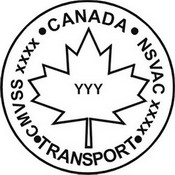In April, Transport Canada (TC) and Health Canada jointly issued a Consumer Information Notice to warn Canadian citizens that it is illegal to import and use a CR in Canada that does not comply with Canadian standards (as verified by the national service mark, shown here). This applies to all CRs, whether purchased by consumers while abroad or shipped to their address by a non-Canadian catalog or online retailer. The reminder was prompted by reports by border officers and CPSTs indicating an influx of CRs being privately imported into Canada.
The warning notes that importation of foreign CRs violates Canada’s Consumer Product Safety Act, and that provincial and territorial legislation, enforced by police, also prohibits foreign CR use in Canada. It also cautions that, if a recall were issued abroad, a Canadian caregiver using a CR from that country would not be informed of the recall.
Additional reasons cited are that Canadian regulations are rigorous and differ from those in other countries. In particular, TC notes these requirements present in Canada but not the U.S.:
- Labels, information, and instructions must be provided in English and French.
- The minimum entry weight allowed for a booster seat is 40 pounds (versus 30 pounds in the US).
- The use of tether straps for all front-facing CRs is mandatory.
- There is a mandatory inversion test for all non-booster CRs.
- There is a booster deflection test.
- All types of CRs are tested installed with a lap-shoulder belt (versus with a lap belt for non-boosters in the U.S.).
- Rebound must be limited for all rear- facing child seats.
- There are energy-absorbing material requirements.
American tourists visiting Canada in U.S.-plated vehicles may use CRs approved by FMVSS 213. However, each province sets a maximum amount of time a visitor may use a U.S. CR in a Canadian vehicle, including rentals.
Resources:
Transport Canada’s Road Safety Information Centre, 1-800-333-0371 (toll free in Canada)

